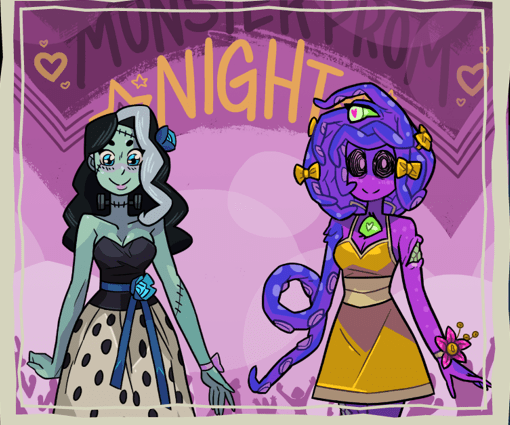Monster Prom is a lighthearted, competitive dating sim/party game mash, published by the studio Beautiful Glitch and distributed through Steam. In this game, you attend a high school for various monsters and must woo one of the love interests for the final “Monster Prom” at the end. It’s made for 1-4 players and involves lots of fun mechanics such as building various stats by making correct choices in the narrative.
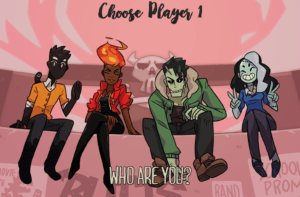
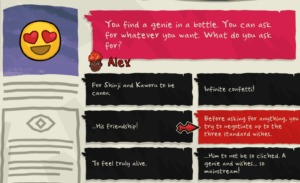
The game begins with taking a short personality quiz to determine the base stats, so the actual character players choose to play as is more of a nice aesthetic choice than a gameplay factor. Then, the main game revolves around choosing to boost these stats by going to various locations, marked with the colored emotes that correspond to similar stats. At these locations, players get to boost this stat, and additionally a narrative event plays. In the event, players potentially gain even more bonuses or perhaps demerits by making a choice.
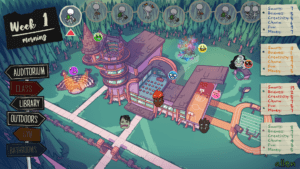
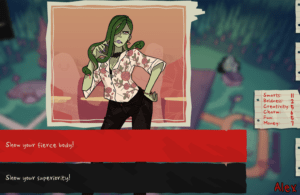
In between, there are also rounds where players are able to sit at a lunch table of their choice and interact with the love interests at the table. Doing so is another way to increase the chance of succeeding with their chosen love interest, besides increasing stats. The game proceeds in this format, as well as having player turn order, which gives advantages, change up based on prompts.
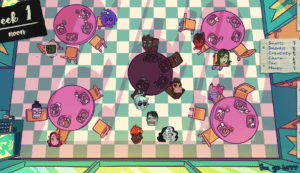
With all this in mind, Monster Prom presents aesthetics of Fantasy and Narrative with its wacky setting of lovable, quirky monsters and the loose story experience of pursuing them in high school. It also presents a Challenge, as the player consistently must try to guess the correct responses and strategize their stat-building, especially given the mechanic that no two players can occupy the same location or lunch table. This stresses the competitive aspect of the game, as any choice a player makes will still affect or limit the options of the other players.
And of course, there is direct competition too! One example in the run I played with friends was that two players were both vying for the heart of Calculester. This resulted in a rivalry throughout the game that ultimately ended up with two different outcomes for the suitors.
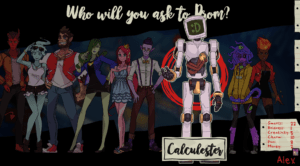
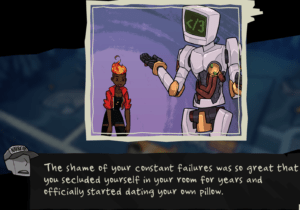
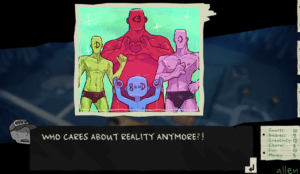
There’s a lot to love about Monster Prom, one of the most lauded being the graphic art and design. The attention to unique and detailed characters is a big draw into the game’s world, not just for the playable characters and love interests, but the side cast as well. This reinforces this idea of a fleshed out fantasy setting, and with the many little graphic pictures depicting key moments as the game progresses add to the narrative aspect as well. But one is also always aware of the strategic gameplay as well, as good and bad choices are immediately conveyed to the player through emotes. Every players stats as well as the timeline for how many events left are also always prominently featured on screen.
These two halves of Monster Prom are also what makes the game different from a typical dating sim or pure party game. It walks the balance between writing interesting content to engage players in the plot, with the way to progress this plot via straightforward party-game mechanics: taking turns, the ability to take actions, quantifiable goals like stats.
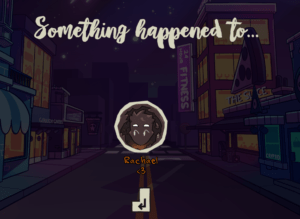
The randomness in Monster Prom – prevalent in things like what events occur and to whom – is very helpful. Players compete by taking up limited resources, but there’s no real abusable room to control the game or directly influence other players’ gameplay. One possible exception is when turns are reset and players re-order themselves based on their perception of a prompt – socially, some players may push other players opinions out such that they gain the turn advantage. The prompts are open-ended and oft based on opinion, and while the game does provide a random dice roll option, it cannot control how players will behave socially or if they will even choose this option.
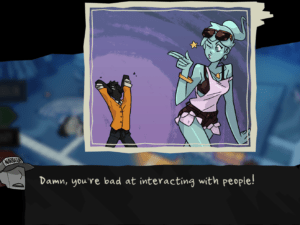
Another point is that while some players enjoyed the randomness and thus low stakes of pursuing an outcome, others can find it a little frustrating to fail from confusion on the criteria or just bad luck. New players are not given an idea of what stat a certain love interest may require, for example. Perhaps a way of alleviating this is keeping random factors in the game, but making these requirements more opaque, or at least an option for players with that preference.
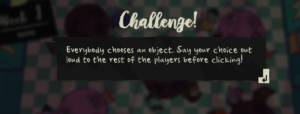
Finally, Monster Prom does seem to ultimately focus on its identity as a party game experience despite being primarily labeled as a dating sim. The narrative content is fairly shallow and each interactive event is basically disconnected from the others. The little prompts to shuffle turn order was a fun way to break up the pace – in that same vein, to help fill in the narrative experience more, Monster Prom might be improved by adding events in between rounds that involve all the players. It could be a mini-game of sorts, for example, or just an extended narrative interaction similar to the format of the starting personality quiz.
Overall, however, Monster Prom is a great social, multiplayer game that also offers lighthearted story supported by refreshing and cute art. The randomness and many outcomes makes it very replayable, and this can even boost the appeal of grinding it in single-player for players who enjoy collection.
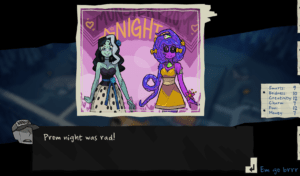
Also, I definitely got the best ending with my favorite adorable eldritch entity, Zoe!


